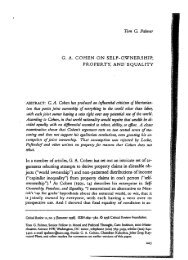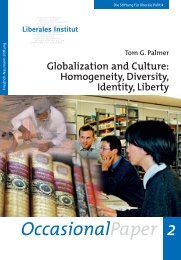Are Patents and Copyrights Morally Justified? - Tom G. Palmer
Are Patents and Copyrights Morally Justified? - Tom G. Palmer
Are Patents and Copyrights Morally Justified? - Tom G. Palmer
Create successful ePaper yourself
Turn your PDF publications into a flip-book with our unique Google optimized e-Paper software.
No. 3] <strong>Are</strong> <strong>Patents</strong> <strong>and</strong> <strong>Copyrights</strong> <strong>Morally</strong><strong>Justified</strong>? 845<br />
agency for their continued existence. The agents they depend<br />
on, however, are not artists, but audiences,” 2<br />
Romantic notions of creativity, which stress subjective experience<br />
<strong>and</strong> its expression, emphasize the sublime experience of<br />
the artist. The reproduction of this experience is what constitutes<br />
the artistic attitude. The artist recreates her own experience<br />
in the audience by means of artistic works or<br />
performances. But the concrete experience ofthe artist cannot<br />
be identical with the concrete experience of the audience—the<br />
readers, listeners, or viewers. In opposition to the romantic notions<br />
ofart taken up in personality theories ofintellectual property,<br />
with their emphasis on the subjective, Roman Ingarden<br />
argues that the identification of the work ofart with its creator’s<br />
subjective experiences would mean that “it would be impossible<br />
either to have a direct intercourse with the work or to know<br />
it.” 118<br />
The reason is that everything that would be directly accessible<br />
to us—except for the perceived characters—would be<br />
only our ideas, thoughts, or, possibly, emotional states. No<br />
one would want to identify the concrete psychic contents experienced<br />
by us during the reading with the already longgone<br />
experiences of the author. Thus, the work is either not<br />
directly comprehensible, or else it is identical with our experiences.<br />
Whatever the case, the attempt to identify the literary<br />
work with a manifold of the author’s psychic<br />
experiences is quite absurd. The author’s experiences cease<br />
to exist the moment the work created by him comes into<br />
existence.” 4<br />
In addition, as Ingarden points out, we would have to ask how<br />
we could exclude from an author’s experiences “a toothache he<br />
might have had in the course of writing,” while simultaneously<br />
including in his work “the desires of a character. . . which the<br />
author himself certainly did not, <strong>and</strong> could not, ~<br />
The fact that two of us can appreciate the “same” work, (say,<br />
for example, a sonata), although we each undergo different<br />
perceptual experiences (you are in the front ofthe hall, I am at<br />
112. Ofcourse, an artist may also be her own audience, but we are here speakingof<br />
ideal roles; one <strong>and</strong> thesame personmay fulfill various roles. When the term “artist” is<br />
used, it will be understood that artist qua artist is meant, <strong>and</strong> similarly of other roles,<br />
such as “audience.”<br />
~18. R. INGARDEN, THE LITERARY WORK OF ART 13-14 (1973).<br />
114. Id.<br />
115. Id. at 14.











